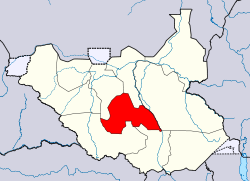Top Lake state advisor says authorities overwhelmed by worsening insecurity
June 3, 2015 (RUMBEK) – Lakes state authorities have acknowledged that local communities were not in their control or cooperating, saying the public refused to share information with security agents of the government in ending the crisis in the South Sudan’s central state.

Lakes state security advisor, Marial Amuom Malek, an outspoken politician who also serves as member of state parliament representing Yirol West county, said communities had continued to turn their back on the government as inter-communal fighting escalates coupled with threats from rebels allied to former vice president, Riek Machar, under the command of General Abdel Latif, who hails from the state.
Amuom was reacting to current complex clashes that left 13 people dead on Monday. Two rival communities of Gony and Thuyic have 11 dead from both sides and two policemen were also killed in Abeer in a separate clash on Monday.
“It has been very difficult for the security apparatus to address this situation. We have tried all the levels that we have but still this situation will never give us a chance to rest,” he lamented.
He said the situation had been exacerbated by proliferation of arms in the hands of the civil populations, making it difficult for the security forces to control the heavily armed Dinka youth who had been turning against each other.
He also added that another challenge was those who intended to go for revenge attacks usually avoided areas where the police and army were being deployed.
“They go to the bush somewhere far from where we deployed our forces and they begin killing whoever they come across. This is a major challenge,” Amoum further explained.
He called on the government to carry out disarmament of the youth throughout the state as the best option in order to arrest the situation.
Activists and traditional leaders also criticized Lakes state government for allegedly having failed to stem violence, accusing the state administration of using violent approach that allowed pastoralist youth to become more hostile. The activist also said disarmament is not the best solution because of rebellion threats in the country.
Moses Ater, a Lakes state activist however suggested that disarmament by relatives and friends within the families would be the best model to disarm the hostile youth in the state. He also said intermarriage between the Dinka rival sections should be encouraged while justice is served without favouritism.
Lakes state has been embroiled in cycles of revenge attacks with many citizens blaming government for allegedly failing to curb insecurity. Hundreds of citizens have been killed over the last few years due to inter-sectional fighting.
The situation recently worsened when a joint force of the police and military withdrew from all hotspots in the state, claiming they had no way to collect information due to communities’ failure to cooperate with the state authorities.
Data from the state’s Criminal Investigation Department (CID) reported an increase in crime-related incidences within the volatile region. Youth activists and traditional authorities have repeatedly called for the removal of the military caretaker governor Matur Dhuol amid claims he had failed to stem the violence. President Salva Kiir has however overlooked these calls.
Dhuol was appointed in 2013 after president Kiir sacked elected governor Chol Tong Mayay.
(ST)
